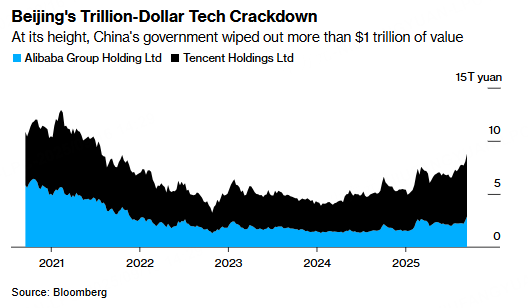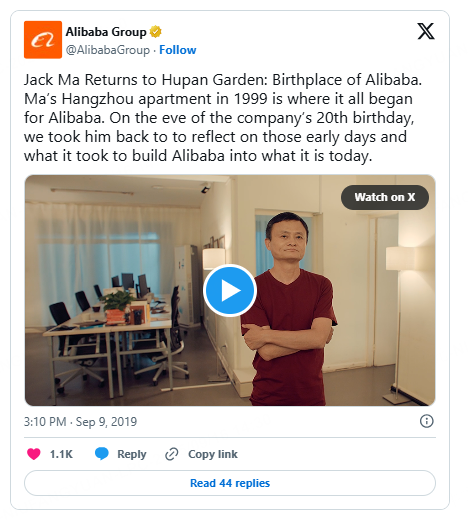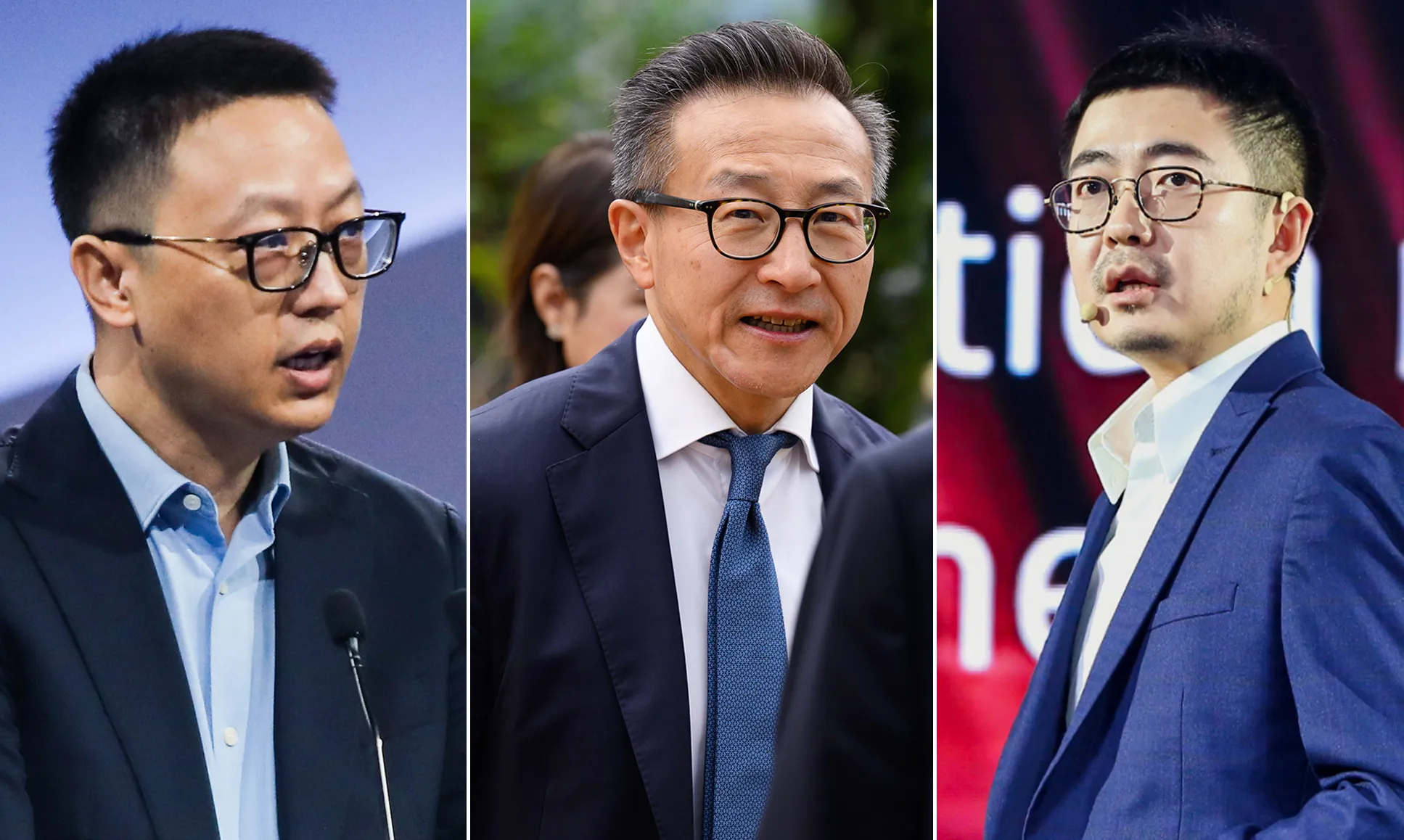Jack Ma Returns With a Vengeance, Making Bold Bets and Pushing AI to "Make Alibaba Great Again"

During the years-long crackdown on China's technology industry, Alibaba Group Holding Ltd.’s internal messaging boards lit up with dreams to “MAGA” – Make Alibaba Great Again. Now, the company is using one of its most potent weapons to achieve this goal: Jack Ma.
After temporarily disappearing from public view due to an anti-monopoly investigation at the end of 2020, China's most renowned entrepreneur has now returned to Alibaba's campuses – and he’s more directly involved than he’s been in half a decade, according to people familiar with the company. There are increasingly clear signs of his behind-the-scenes manipulation, especially in Alibaba's shift of business focus to artificial intelligence and its challenges to e-commerce rivals JD.com and Meituan. Ma was instrumental in Alibaba’s decision to spend as much as 50 billion yuan ($7 billion) on subsidies to beat back JD’s surprise entry to the market, said one of the people, requesting not to be named because the matter is private.
Starting from 2023, the operations of Alibaba are being managed by two of Jack Ma's longest-serving deputies, Joe Tsai and Eddie Wu. There is no clear information yet on whether Jack Ma himself will return in any official capacity. An Alibaba representative didn’t respond to an email with a detailed request for comment. However, people familiar with the company's operations said that the 61-year-old founder is at his most hands-on since resigning as chairman in 2019. Beyond helping orchestrate billions in spending, he’s also seeking constant updates on Alibaba’s broader AI endeavors. In one instance, he messaged a senior manager three times in a day asking for updates, according to one of the people.
Ma was once the richest and most influential technology business leader in China. His return has been highly anticipated, and it is seen as a signal that China's previously freewheeling technology industry is regaining support from the Beijing authorities. But he’s expected to keep a lower profile than before the crackdown, when he appeared on panels at Davos and judged an African talent show.
 Awards Ceremony Of Africa Netpreneur Prize 2019 Held In Ghana
Awards Ceremony Of Africa Netpreneur Prize 2019 Held In Ghana
"Jack Ma is Alibaba's biggest PR figure, biggest personality, biggest idol," said Li Chengdong, head of Beijing-based internet think-tank Haitun. "The return of the big boss means he's no longer a risk, and that just gets everyone's blood pumping."
Ma is coming to terms with the new realities in Chinese e-commerce, marked by red-hot competition and a battle for retail users hunting for meals, groceries, and electronics delivered in an hour or less. Top company officials are trying to make him understand that the days when Alibaba held 85% of the market are long gone, one of the people said. He’s betting that the company's core shopping platform Taobao can beat JD and Meituan following recent success in clawing back market share. As of July, Alibaba has 43% of China’s food delivery market, trailing Meituan with 47%, according to Goldman Sachs Inc.
However, this battle might cause a conflict between Jack Ma and the authorities who want to terminate what they consider as "malicious subsidies". Moreover, he’s risking fresh ire over Alibaba’s role in the price war.
In 2020, a controversial speech given by Jack Ma led to his withdrawal from the public eye. Just a few days after he publicly criticized Chinese financial institutions as "pawnshops", the regulatory authorities blocked Alibaba's plan to list Ant Group. A few weeks later, the Chinese government launched a long-term campaign aimed at strengthening the state's control over the economy to curb the domestic wealthy class. Jack Ma suddenly found himself at the center of a regulatory storm, which quickly spread to numerous competitors ranging from Didi Global Company to the then large-scale online education companies, forcing other billionaire entrepreneurs to hide their identities and triggering the largest wealth loss event in modern Chinese history. Alibaba's market value lost nearly 700 billion US dollars - equivalent to the current market value of the entire Tencent Holdings Limited.

During a visit to the headquarters of Alibaba’s cloud division in April, Ma walked past walls pinned with emotional messages from long-serving employees describing the difficulties the company faced during his time away. Flanked by staff sitting on mats on staircases, and with employees listening in from Tokyo and Hong Kong, Ma showed off his trademark eloquence, attendees said, also requesting anonymity to discuss the event.
“Technology isn’t just about conquering the stars and the oceans,” he said, according to a transcript reviewed by Bloomberg News. “It’s about preserving the spark in all of us.”
Ma went on to spell out the crucial role of the company’s cloud platform, its self-made T-head chips, and its Qwen family of AI models, about which he said he was receiving daily updates. After the event, some attendees said they felt pumped up and inspired, as if they had witnessed the culture of a startup on its first day.

Alibaba has come a long way since its founding in 1999, when Ma scraped together $80,000 from 80 investors to start an online marketplace. In 2014, it scored the single biggest coming out party at the time with a $25 billion IPO. In the following years it swung from strength to strength, pushing its market cap past $800 billion. But after Ma fell out with regulators, and the pandemic crippled China’s economy, its stock tanked.
As he looks to restore Alibaba’s former glory, Ma is counting on familiar faces Wu and Tsai as well as rising star Jiang Fan. Wu is viewed as more permanent than a transitional figure and his tech background makes him well-placed to continue to lead, especially on AI, the people said. As chairman, Tsai serves as Ma’s main ally on the board, while Jiang has been entrusted to run a new-look e-commerce operation that today stretches from Singapore to Istanbul.
“Alibaba has clearly already been in very good hands with the return of pioneers like Eddie, Joe and Jiang Fan,” said Vey-Sern Ling, managing director at Union Bancaire Privée. “It has refocused on technology and its core businesses with disciplined investments and arguably is now entering a phase where it starts to reap returns."
Wu is leading the company’s top priority: the pursuit of artificial general intelligence. In February, Alibaba vowed to spend more than 380 billion yuan on AI and cloud infrastructure over the next three years. Although widespread AI monetization remains out of reach, the company managed in August to notch a 26% jump in cloud revenue — its fastest pace of quarterly expansion in years. That helped push its stock increase for the year to 88% through Monday’s close, though its $380 billion market cap is less than half of its peak.

Apart from the field of artificial intelligence, Jack Ma has also exerted influence on the company's core e-commerce business - which remains the company's largest source of profit. According to a person close to Jack Ma, the decline in Alibaba's market share in 2023 directly prompted Jack Ma to support the removal of the then CEO Daniel Zhang. In the same year, Jack Ma released a message on an internal forum, urging the company to "correct its direction". At that time, the new e-commerce giant Pinduoduo Holdings was on the verge of surpassing Alibaba's market value, and it did eventually achieve this. The company is still recovering from a series of mistakes made under Zhang's leadership, when, with Jack Ma's tacit approval, Zhang invested tens of billions of yuan in large supermarket chains and made a wrong bet that Chinese consumption would further deepen and expand. During Zhang's tenure, Alibaba was split into six independent departments, including the cloud services and logistics departments, each of which had the right to conduct an initial public offering on its own. However, due to market fluctuations, these plans were ultimately shelved. The firstred capital, which left Alibaba, did not respond to requests for comment and refused to provide his contact information.
“Jack has kind of a moral authority in the company to make the big calls and also to criticize executives, indirectly or directly, or criticize strategy when he thinks it's in the wrong direction,” said Duncan Clark, author of Alibaba: The House That Jack Ma Built. “He's not a day-to-day micromanager. But his word or his displeasure can be expressed in a way which will make the company make changes."
Jiang has been entrusted with significant responsibilities, tasked with managing Alibaba's more unified e-commerce empire, and he is now coordinating food delivery, hotel reservations and logistics operations more closely. According to informed sources, this former software engineer was once part of a group of executives personally mentored by Jack Ma. Although he was removed from the core leadership team that influences board appointments after a scandal in 2020, his position has been restored this year.
Although Jack Ma's return has strengthened the company's internal confidence in its direction, it has also brought some challenges. These sources said that his presence within the company has made the organizational structure more complex, as some employees regard him as the highest decision-maker of Alibaba. However, he does not have a formal title and no longer participates in more specific decision-making.
To some, Ma’s return feels like a last-ditch effort by a first-generation tech founder to reclaim his legacy. Like other early Alibaba employees, he adopted a moniker from fictional Kung Fu legends, and often compared the entrepreneurial path to a hero's quest.
“He’s probably convinced that it’s time to come out of seclusion and make his mark by defeating Meituan,” said Chen Weixing, founder of ride-hailing app Kuaidi Dache. “He’s living in the illusion of his own martial arts epic.”
Ma is unlikely to return to Alibaba in an official capacity. But these days, he wears a company badge wherever he goes on campus – a gesture employees interpret as a sign he’s back in action.
When he handed the reins to Zhang, Ma told Chinese state media: “Retirement doesn’t mean I’ve left Alibaba. If Alibaba calls me, I’ll always be there.”







